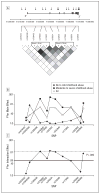Influence of child abuse on adult depression: moderation by the corticotropin-releasing hormone receptor gene
- PMID: 18250257
- PMCID: PMC2443704
- DOI: 10.1001/archgenpsychiatry.2007.26
Influence of child abuse on adult depression: moderation by the corticotropin-releasing hormone receptor gene
Abstract
Context: Genetic inheritance and developmental life stress both contribute to major depressive disorder in adults. Child abuse and trauma alter the endogenous stress response, principally corticotropin-releasing hormone and its downstream effectors, suggesting that a gene x environment interaction at this locus may be important in depression.
Objective: To examine whether the effects of child abuse on adult depressive symptoms are moderated by genetic polymorphisms within the corticotropin-releasing hormone type 1 receptor (CRHR1) gene.
Design: Association study examining gene x environment interactions between genetic polymorphisms at the CRHR1 locus and measures of child abuse on adult depressive symptoms.
Setting: General medical clinics of a large, public, urban hospital and Emory University, Atlanta, Georgia.
Participants: The primary participant population was 97.4% African American, of low socioeconomic status, and with high rates of lifetime trauma (n = 422). A supportive independent sample (n = 199) was distinct both ethnically (87.7% Caucasian) and socioeconomically (less impoverished).
Main outcome measures: Beck Depression Inventory scores and history of major depressive disorder by the Structured Clinical Interview for DSM-IV Axis I Disorders.
Results: Fifteen single-nucleotide polymorphisms spanning 57 kilobases of the CRHR1 gene were examined. We found significant gene x environment interactions with multiple individual single-nucleotide polymorphisms (eg, rs110402, P = .008) as well as with a common haplotype spanning intron 1 (P < .001). Specific CRHR1 polymorphisms appeared to moderate the effect of child abuse on the risk for adult depressive symptoms. These protective effects were supported with similar findings in a second independent sample (n = 199).
Conclusions: These data support the corticotropin-releasing hormone hypothesis of depression and suggest that a gene x environment interaction is important for the expression of depressive symptoms in adults with CRHR1 risk or protective alleles who have a history of child abuse.
Figures




Comment in
-
Child abuse and adult major depression: no evidence of protective gene.Arch Gen Psychiatry. 2008 Nov;65(11):1336-7; author reply 1337-9. doi: 10.1001/archpsyc.65.11.1336. Arch Gen Psychiatry. 2008. PMID: 18981346 No abstract available.
References
-
- Caspi A, Sugden K, Moffitt TE, Taylor A, Craig IW, Harrington H, McClay J, Mill J, Martin J, Braithwaite A, Poulton R. Influence of life stress on depression: moderation by a polymorphism in the 5-HTT gene. Science. 2003;301(5631):386–389. - PubMed
-
- Kendler KS, Kuhn JW, Vittum J, Prescott CA, Riley B. The interaction of stressful life events and a serotonin transporter polymorphism in the prediction of episodes of major depression: a replication. Arch Gen Psychiatry. 2005;62(5):529–535. - PubMed
-
- Heils A, Teufel A, Petri S, Stöber G, Riederer P, Bengel D, Lesch KP. Allelic variation of human serotonin transporter gene expression. J Neurochem. 1996;66(6):2621–2624. - PubMed
-
- Kaufman J, Plotsky PM, Nemeroff CB, Charney DS. Effects of early adverse experiences on brain structure and function: clinical implications. Biol Psychiatry. 2000;48(8):778–790. - PubMed
-
- Wilhelm K, Mitchell PB, Niven H, Finch A, Wedgwood L, Scimone A, Blair IP, Parker G, Schofield PR. Life events, first depression onset and the serotonin transporter gene. Br J Psychiatry. 2006;188:210–215. - PubMed
Publication types
MeSH terms
Substances
Grants and funding
- R56 MH071537/MH/NIMH NIH HHS/United States
- M01 RR00039/RR/NCRR NIH HHS/United States
- R01 MH071537/MH/NIMH NIH HHS/United States
- DA015766/DA/NIDA NIH HHS/United States
- MH069884/MH/NIMH NIH HHS/United States
- R01 MH042088/MH/NIMH NIH HHS/United States
- K01 MH069884/MH/NIMH NIH HHS/United States
- MH-58922/MH/NIMH NIH HHS/United States
- P50 MH058922/MH/NIMH NIH HHS/United States
- M01 RR000039/RR/NCRR NIH HHS/United States
- K02 DA015766/DA/NIDA NIH HHS/United States
- P50-MH 68036/MH/NIMH NIH HHS/United States
- MH-42088/MH/NIMH NIH HHS/United States
- UL1 TR000454/TR/NCATS NIH HHS/United States
- P50 MH068036/MH/NIMH NIH HHS/United States
- MH071537/MH/NIMH NIH HHS/United States
LinkOut - more resources
Full Text Sources
Other Literature Sources
Medical

